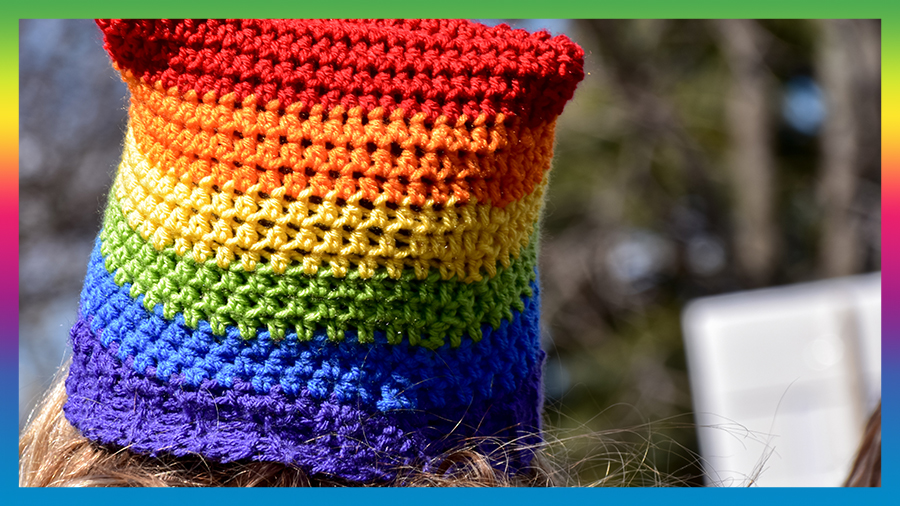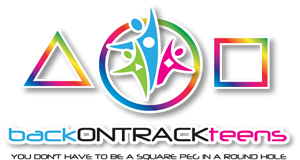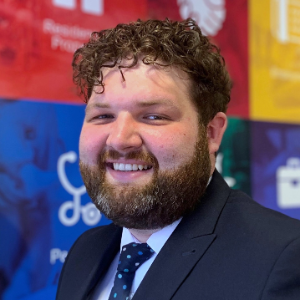
15 Sep Ryan’s story: What is feminine and what is masculine? I mean, I used to sit on the train crocheting on the way to work!
Hey – thanks for having us on your screen. Welcome to the Back on Track Teens blog for young people and those young at heart.
You’ve loaded a blog article that’s part of a mini-series about gender and sexual identity*. The mini-series shares 11 wonderful and inspiring stories from young people who identify as LGBTQ+. Feel free to read on but you may want to pause and have a quick scan of the opening article to give a bit of context around the collection of stories and resources available. Please click here to read the first article.
“My mum asked me a few times growing up whether I was gay – she obviously saw it before I did” – Ryan
The latest in the Back on Track Teens mini-series exploring gender and sexual identity introduces Ryan, a gay man, who believes we are in a gender and sexual identity revolution right now.
The conversation is lovely, lively, honest and hilarious in places. Ryan shares his coming out story and his thoughts on all sorts of things from heteronormativity, gay stereotypes, crocheting on a train and Dolly Parton.
“I thought that I was coming out quite late, close to 22 years old. Before that I had some feelings of attraction towards men, but I’d denied it. I pushed it down and convinced myself that it was a purely sexual attraction and that I was always going to end up with a wife and kids in a heterosexual marriage. The turning point was when I was randomly talking to somebody, to a guy, and I started to feel romantically attracted to him and that was the first time that had happened, and then it was a case of OK what’s this, what do I do with this? I came out as bi but within about six months I realised I’ve not been looking at women… yep, I’m gay.”
Ryan feels that as a society we are in the middle of a gender and identity revolution, and he makes a great point. Many people, particularly those who are younger, appear to be taking the time to consider and explore how they identify. From sexual identities that fall under the LGBTQ+ umbrella to gender identities that exist beyond the cisgender binary (such as gender-fluid), Ryan feels that there’s more openness and opportunity to explore.
Many, if not all of the ways that it’s possible to identify in terms of sexuality and gender have always existed – for as long as people have existed, really! By once again opening up the space for people to explore these identities safely, we can begin to challenge the very harmful effects of phenomena like heteronormativity. Ryan believes that it will still take time because people only feel the need to ‘come out’ if their gender and sexual identity is ‘against the grain’.
What was it like to ‘come out’?
“I had to come out to myself first and confront it on an individual level to accept myself. My mum asked me a few times growing up whether I was gay – she obviously saw it before I did, but I had denied it so many times that when I eventually did tell her she was genuinely surprised. I told my dad and he said, “I completely support you no matter what and will always love you’ which was lovely.”
My mum told my nan while she was lying on a hospital gurney experiencing chest pains!”
Ryan explains how he feels more comfortable sharing his sexuality with people when starting a new job or meeting new friends because once it’s voiced, he can be himself.
“It’s a continual process and there will always be times when it’s a bit more awkward than others, but it definitely does get easier because you know how to do it and get on with it.”
Discussing stereotypes and homophobia
“In school I actually did [experience homophobia], and I think it’s because I was exhibiting typical gay traits although I didn’t realise it.”
Ryan has experienced slurs from people driving past in cars when he’s been walking. More recently, Ryan was in Manchester with his partner when they heard offensive remarks directed at them by a man barging past in a rush. Ultimately though, Ryan says, “As long as you know you’re in a safe space, in my opinion it’s not really worth confronting [them].”
“Ignorant people will always make passive comments and pass slurs but usually that’s where it ends. [It] shocks you the first couple of times but after a while you come to expect it.”
Ryan holds hands with his husband in public, but they unlock hands if they see large groups of people who they perceive as being a potential threat, or in settings where they don’t feel comfortable. He thinks the point at which we will know society has accepted LGBTQ+ relationships will be when this sort of gesture is no longer seen as different to how a heterosexual couple might express affection for one another.
Stereotyping is a fact of life. Everyone is likely to be on the receiving end of a judgement rooted in stereotype at some point in their life – and are just as likely to pass judgement themselves (even if this occurs inadvertently through instances of unconscious bias). These judgements may not be intentional and will possibly be due to a lack of knowledge or reliance on misinformation. Unfortunately, though, many minority groups are subject to harm from perpetuated stereotypes that are offensive in nature.
Ryan thinks that the LGBTQ+ community needs more opportunities to tell their own stories. Characters need to be included in a movie or TV storyline rather than put on a pedestal and congratulated for being brave. One prevalent, potentially damaging stereotype of a gay man that particularly grates on Ryan is that of the camp, pretty, skinny cis man who likes to party, gets emotional and has a female best friend.
Media representation plays a big part in how people in general see the world. If the media portrays stereotypes, viewers who are less discerning will have more reason to believe that these stereotypes are universally true, regardless of the unique traits and experience of the individual.
As Ryan relates, gender is a social construct. Certain groups and society as a whole prefer to assign labels to everything, but not everything fits neatly into a box. People make mistakes and worry about what others think or say. Ryan believes that we do this because we’re conditioned to understand the world in a certain way.
“I have had people assume I fit certain stereotypes. They say, ‘You don’t walk like a gay person. You don’t talk like a gay person’. Well what do they sound like or walk like?
I don’t think you have feminine and masculine traits. What is feminine and what is masculine? I mean, I used to sit on the train crocheting on the way to work – people always burst out laughing at the idea of a guy with a big beard in a suit on a train from Manchester to Stoke crocheting. I bake, I sew and all that stuff, so to some extent I do sort of play into what people would label as a ‘homely gay’.”
Ryan shares that he lost a lot of weight when he came out because he felt he needed to embody the image of the typical skinny gay men as portrayed in the media.
“I lost three stone. I hadn’t been on many dates, and I put that down to not looking the right way. I felt I did need to fit into a stereotype. Now I don’t care, I do whatever I want. One day I’m doing DIY making a greenhouse outside and the next I’m baking a cake inside. When you come out you need to discover your new self.”
What resources are out there to help people learn more?
Ryan says he found very few resources when he was questioning his identity and puts much of it down to not having people around him to recommend where to look. He watched TV shows such as Sex in the City and Will and Grace that included LGBTQ+ characters but he says they would often fall foul to stereotypes and the characters were rarely played by actors who identify as LGBTQ+ in real life, which made it hard to empathise fully with their stories.
The best advice Ryan can give is to research online and ask a lot of questions. He says there are many well-known YouTubers now who do a lot of activist work in terms of representation.
“I found more support in female role models…the reason why gay men are drawn to strong female characters is because they see more traits gay men are exploring.”
The more accessible resources are, the more people can learn. Ryan says accessibility in schools needs to be better and that the easiest way to get information out there is through the school system because every child has to attend.
Ryan lives in Manchester and says the city has a good gay scene, describing it as open, free and a really good community. The city has fond memories for Ryan because he met his now husband there and ‘came out of the closest’ when he attended university.
Ryan also shares that Manchester Pride offers a warm, welcoming environment and is a great event to attend if you have questions and want to learn from the LGBTQ+ community.
“Within an hour I just thought, yes these are my people and I never felt that before.”
What advice would Ryan offer to parents?
Ryan’s advice to parents is simply to be open and help their children to normalise LGBTQ+ identities from a young age.
“Improving visibility doesn’t turn people a certain way it supports people to feel comfortable in who they are. Children don’t come into this world homophobic and racist – they are traits that are learned. Adults teach kids behaviours. It makes the process so much easier because you know your parents are accepting. The more we teach, the quicker we progress.”
Ryan recently spotted an advert on Facebook for a dictionary of LGBTQ+ terms. This is exactly the sort of resource that will make it so much easier for conversations to be started and evolved. A lot of prejudice comes from ignorance and lack of knowledge and if people can be educated, ignorance can slowly be dispersed.
What advice would Ryan give to his younger self if he got the chance?
“Given that I denied it for so long, if I could go back now, I would say it’s not just a phase, it’s not just a sexual attraction thing. I do feel like coming out at 21, I missed out on some of the things I would have experienced as a teenager growing up in high school as a gay boy. You will understand yourself a lot better if you give yourself the freedom to explore and don’t be afraid.” Ryan.
Listen to Ryan's story
Choose the life you want to lead
Ryan’s outlook on life is full of positivity and while he’s aware that much work is still to be done, his experience as a gay man has been a positive one.
Listen to other stories like Ryan’s on the Spark to Your Success podcast and share your positive experiences with us on social:
Making a difference is about how you approach people and choose not to make assumptions. Being an ally to the LGBTQ+ community is a step towards starting conversations and breaking down barriers. What can you do today?
“The Lord is my Shepherd and he knows I’m gay.” – Troy Perry
Thanks for reading…
Creating the gender and sexual identity mini-series has been an incredible experience for the Back on Track Teens team.
- I encourage you to go ahead and download our free eBook, which brings the interviews together with a huge collection of information, resources and inspiration.
- Subscribe to the Spark to Your Success podcast here.
- Access insightful stories, helpful exercises and more resources on our blog.
- Refer to the Back on Track Teens LGBTQ+ glossary here.
- Order ‘The Spark to Your Success – Helping Teens Build Resilience’ here.
- Order ‘The Spark to Your Success – Mindset Magic for Teens’ here.
Are you a parent or caregiver of a young person who may be experiencing challenges around gender and/or sexual identity? Book a session with TeeJay Dowe
Work at a school or organisation and want to know more? Book an awareness training session
*The blog articles capture real stories and the topic of conversation is frank. Its purpose is to elevate the voices of people within the LGBTQ+ community, answer questions, provide resources, and offer support.



No Comments